Progressive Conservative Party of Canada leadership elections
The first Progressive Conservative Party of Canada leadership election was held in 1927, when the party was called the Conservative Party. Prior to then the party's leader was chosen by the caucus or in several cases by the Governor General of Canada designating a Conservative MP or Senator to form a government after the retirement or death of an incumbent Conservative Prime Minister.[1]
There have been two permanent leaders since 1927 who were not chosen by a leadership convention. Arthur Meighen agreed to serve a second term as leader in 1941 on condition that he would not have to contest the position. The party agreed since the party was desperate for a leader of Meighen's stature. Jean Charest was one of only two Progressive Conservative Members of Parliament returned in the 1993 election and was appointed leader by the party's executive with the decision later being affirmed at a regular party convention two years later. The Conservative Party became the Progressive Conservative Party in 1942.[1]
All leadership conventions were delegated conventions, except in 1998 when a one member, one vote process was used in which each riding was allocated 100 points which were distributed among candidates by proportionally. For the 2003 leadership election, the party reverted to use of a delegated convention, ostensibly because of the cost of using a one member, one vote process (though it has been argued that the party feared that use of one member, one vote would make an outside takeover of the party easier due to a decline in membership). In 2003, the party merged with the Canadian Alliance to form a new Conservative Party of Canada. This party adopted the one member, one vote process the Tories had used in 1998.
Note on tables: Green box indicates winner. Pink box indicates candidate eliminated from ballot for receiving the fewest votes. Blue box indicates candidate withdrew from balloting.
1927 Conservative leadership convention
Held in Winnipeg, Manitoba on October 11, 1927.
| Candidate | 1st ballot | 2nd ballot | |||
|---|---|---|---|---|---|
| Votes cast | % | Votes cast | % | ||
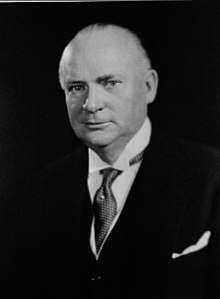 |
Bennett, Richard Bedford | 594 | 38.0% | 780 | 50.2% |
| Guthrie, Hugh | 345 | 22.0% | 320 | 20.6% | |
| Cahan, Charles Hazlitt | 310 | 19.8% | 266 | 17.1% | |
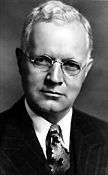 |
Manion, Robert James | 170 | 10.9% | 148 | 9.5% |
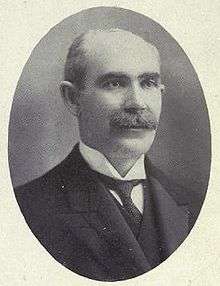 |
Rogers, Robert | 114 | 7.3% | 37 | 2.4% |
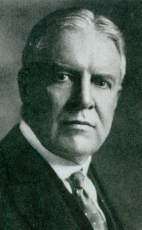 |
Drayton, Henry Lumley | 31 | 2.0% | 3 | 0.2% |
| Total | 1,564 | 100.0% | 1,554 | 100.0% | |
George Halsey Perley, H. H. Stevens, John Allister Currie, John Baxter, Howard Ferguson, Edgar Nelson Rhodes, and outgoing leader Arthur Meighen were all nominated but declined to run.[2]
1938 Conservative leadership convention
Held in Ottawa, Ontario on July 7, 1938.
| Candidate | 1st ballot | 2nd ballot | |||
|---|---|---|---|---|---|
| Votes cast | % | Votes cast | % | ||
 |
Manion, Robert James | 726 | 46.4% | 830 | 53.0% |
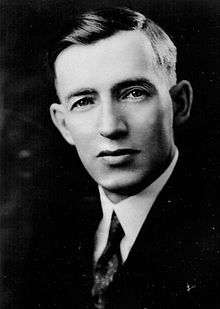 |
MacPherson, Murdoch Alexander | 475 | 30.3% | 648 | 41.4% |
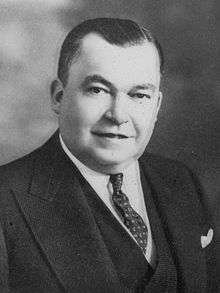 |
Harris, Joseph Henry | 131 | 8.4% | 49 | 3.1% |
| Massey, Denton | 128 | 8.2% | 39 | 2.5% | |
| Lawson, James Earl | 105 | 6.7% | Eliminated | ||
| Total | 1,565 | 100.0% | 1,566 | 100.0% | |
Manion lost his seat in the 1940 federal election and R.B. Hanson became interim leader. In November 1941 a national conference of the party voted against having a leadership convention and instead appointed Arthur Meighen as the party's wartime leader. Meighen was defeated in a 1942 by-election and resigned.
1942 Progressive Conservative leadership convention
Held in Winnipeg, Manitoba on December 11, 1942.
| Candidate | 1st ballot | 2nd ballot | |||
|---|---|---|---|---|---|
| Votes cast | % | Votes cast | % | ||
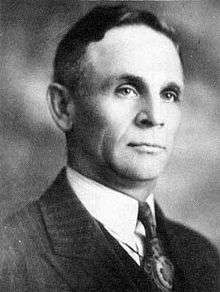 |
Bracken, John | 420 | 48.3% | 538 | 61.7% |
 |
MacPherson, Murdoch Alexander | 222 | 25.5% | 255 | 29.2% |
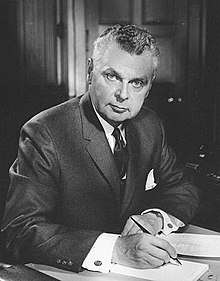 |
Diefenbaker, John George | 120 | 13.8% | 79 | 9.1% |
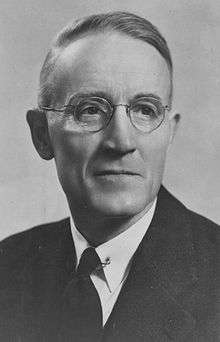 |
Green, Howard Charles | 88 | 10.1% | Withdrew | |
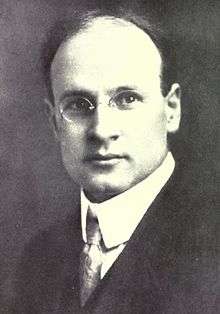 |
Stevens, Henry Hubert | 20 | 2.3% | Eliminated | |
| Total | 870 | 100.0% | 872 | 100.0% | |
1948 Progressive Conservative leadership convention
Held in Ottawa, Ontario on October 2, 1948.
| Candidate | Delegate Count | Percentage | |
|---|---|---|---|
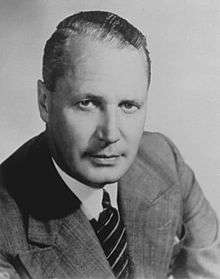 |
Drew, George Alexander | 827 | 66.6% |
 |
Diefenbaker, John George | 311 | 25.0% |
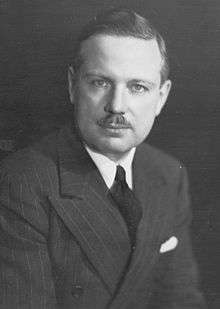 |
Fleming, Donald Methuen | 104 | 8.4% |
| Total | 1,242 | 100% | |
Wilfrid Garfield Case announced his candidacy but withdrew before the convention to support Drew.
1956 Progressive Conservative leadership convention
Held in Ottawa, Ontario on December 14, 1956.
| Candidate | Delegate Count | Percentage | |
|---|---|---|---|
 |
Diefenbaker, John George | 774 | 60.3% |
 |
Fleming, Donald Methuen | 393 | 30.6% |
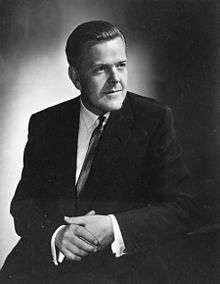 |
Fulton, Edmund Davie | 117 | 9.1% |
| Total | 1,284 | 100% | |
1967 Progressive Conservative leadership convention
The 1967 leadership convention was held in Toronto, Ontario on September 9, 1967.
| Candidate | 1st ballot | 2nd ballot | 3rd ballot | 4th ballot | 5th ballot | ||||||
|---|---|---|---|---|---|---|---|---|---|---|---|
| Votes cast | % | Votes cast | % | Votes cast | % | Votes cast | % | Votes cast | % | ||
| Stanfield, Robert Lorne | 519 | 23.3% | 613 | 27.7% | 717 | 32.7% | 865 | 40.1% | 1,150 | 54.3% | |
| Roblin, Dufferin (Duff) | 347 | 15.6% | 430 | 19.4% | 541 | 24.7% | 771 | 35.7% | 969 | 45.7% | |
 |
Fulton, Edmund Davie | 343 | 15.4% | 346 | 15.7% | 361 | 16.5% | 357 | 16.5% | Endorsed Stanfield | |
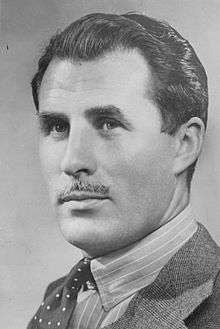 |
Hees, George Harris | 295 | 13.2% | 299 | 13.5% | 277 | 12.6% | Endorsed Stanfield | |||
 |
Diefenbaker, John George | 271 | 12.2% | 172 | 7.8% | 114 | 5.2% | Endorsed Roblin | |||
| McCutcheon, Malcolm Wallace | 137 | 6.1% | 76 | 3.4% | Endorsed Stanfield | ||||||
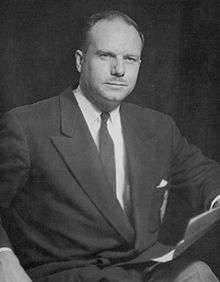 |
Hamilton, Francis Alvin George | 136 | 6.1% | 127 | 5.8% | 106 | 4.8% | 167 | 7.7% | Did not endorse | |
 |
Fleming, Donald Methuen | 126 | 5.7% | 115 | 5.2% | 76 | 3.5% | Endorsed Stanfield | |||
| Starr, Michael | 45 | 2.0% | 34 | 1.5% | Did not endorse | ||||||
| MacLean, John | 10 | 0.4% | Withdrew because he did not want the convention “to go too late” | ||||||||
| Walker-Sawka, Mary | 2 | - | Did not endorse | ||||||||
| Total | 2,231 | 100.0% | 2,212 | 100.0% | 2,192 | 100.0% | 2,160 | 100.0% | 2,119 | 100.0% | |
1976 Progressive Conservative leadership convention
The 1976 leadership convention was held in Ottawa, Ontario on February 22, 1976.
| Candidate | 1st ballot | 2nd ballot | 3rd ballot | 4th ballot | |||||
|---|---|---|---|---|---|---|---|---|---|
| Votes cast | % | Votes cast | % | Votes cast | % | Votes cast | % | ||
| Wagner, Claude | 531 | 22.5% | 667 | 28.5% | 1,003 | 42.8% | 1,122 | 48.6% | |
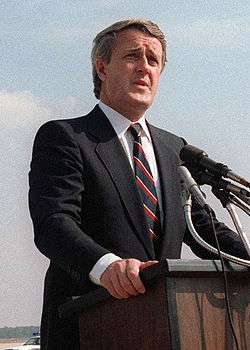 |
Mulroney, Martin Brian | 357 | 15.1% | 419 | 17.9% | 369 | 15.8% | Did not endorse | |
 |
Clark, Charles Joseph (Joe) | 277 | 11.7% | 532 | 22.8% | 969 | 41.4% | 1,187 | 51.4% |
| Horner, John Henry (Jack) | 235 | 10.0% | 286 | 12.2% | Endorsed Wagner | ||||
| MacDonald, Flora Isabel | 214 | 9.1% | 239 | 10.2% | Endorsed Clark | ||||
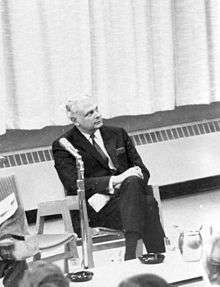 |
Hellyer, Paul Theodore | 231 | 9.8% | 118 | 5.1% | Endorsed Wagner | |||
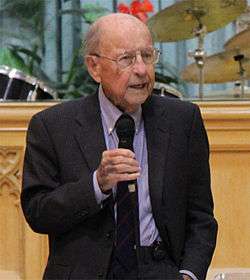 |
Stevens, Sinclair McKnight | 182 | 7.7% | Endorsed Clark | |||||
| Fraser, John Allen | 127 | 5.4% | 34 | 1.5% | Endorsed Clark | ||||
| Gillies, James McPhail | 87 | 3.7% | Endorsed Clark | ||||||
| Nowlan, John Patrick (Pat) | 86 | 3.6% | 42 | 1.8% | Endorsed Wagner | ||||
| Grafftey, William Heward | 33 | 1.4% | Endorsed Clark | ||||||
| Total | 2,360 | 100.0% | 2,337 | 100.0% | 2,341 | 100.0% | 2,309 | 100.0% | |
Richard Quittenton withdrew from the race before the convention began.
1983 Progressive Conservative leadership convention
The 1983 leadership convention was held in Ottawa, Ontario on June 11, 1983.
| Candidate | 1st ballot | 2nd ballot | 3rd ballot | 4th ballot | |||||
|---|---|---|---|---|---|---|---|---|---|
| Votes cast | % | Votes cast | % | Votes cast | % | Votes cast | % | ||
 |
Clark, Charles Joseph (Joe) | 1,091 | 36.5% | 1,085 | 36.7% | 1,058 | 35.8% | 1,325 | 45.6% |
 |
Mulroney, Martin Brian | 874 | 29.2% | 1,021 | 34.6% | 1,036 | 35.1% | 1,584 | 54.5% |
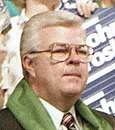 |
Crosbie, John Carnell | 639 | 21.4% | 781 | 26.4% | 858 | 29.1% | Did not endorse | |
| Crombie, David Edward | 116 | 3.9% | 67 | 2.3% | Endorsed Crosbie | ||||
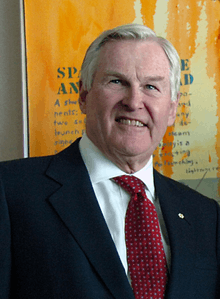 |
Wilson, Michael Holcombe | 144 | 4.8% | Endorsed Mulroney | |||||
| Pocklington, Peter Hugh | 102 | 3.4% | Endorsed Mulroney | ||||||
| Gamble, John Albert | 17 | 0.6% | Endorsed Mulroney | ||||||
| Fraser, Neil | 5 | 0.2% | Endorsed Mulroney | ||||||
| Total | 2,988 | 100.0% | 2,954 | 100.0% | 2,952 | 100.0% | 2,909 | 100.0% | |
1993 leadership convention results
The 1993 leadership convention was held in Ottawa, Ontario on June 13, 1993.
| Candidate | 1st ballot | 2nd ballot | |||
|---|---|---|---|---|---|
| Votes cast | % | Votes cast | % | ||
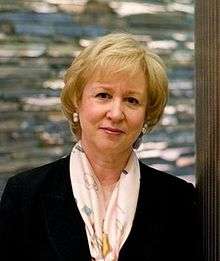 |
Campbell, Avril Phædra Douglas (Kim) | 1,664 | 48.0% | 1,817 | 52.7% |
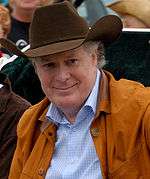 |
Charest, John James (Jean) | 1,369 | 39.4% | 1,630 | 47.3% |
| Edwards, James Stewart (Jim) | 307 | 8.9% | Endorsed Campbell | ||
| Turner, John Garth | 76 | 2.2% | Did not endorse | ||
| Boyer, J. Patrick | 53 | 1.5% | Endorsed Charest | ||
| Total | 3,469 | 100.0% | 3,447 | 100.0% | |
1995 Progressive Conservative leadership convention
The 1995 leadership convention was held at the Palais des congrès de Gatineau[3] in Hull, Quebec on April 29, 1995, to ratify Jean Charest as leader. Charest had been named interim leader following the 1993 federal election (and Kim Campbell's resignation as party leader), which reduced the Progressive Conservatives to only two seats, with Charest being the only cabinet minister to win re-election.
| Candidate | Yes | No | |||
|---|---|---|---|---|---|
| Delegate Count | % | Delegate Count | % | ||
 |
Charest, John James (Jean) | 1,187 | 96.04% | 49 | 3.96% |
| Total | 1,236 | ||||
1998 Progressive Conservative leadership election
First ballot was conducted October 24, 1998; second ballot was conducted November 14, 1998.
The 1998 election used a point system that allocated 100 points to each riding, regardless of the number of votes cast in the riding. The candidate who won a majority of points (not necessarily a majority of voters) would win the leadership. All party members were eligible to cast a vote. The 100-point-per-riding system was again used by the Conservative Party of Canada in its 2004 leadership race.
| Candidate | First Ballot October 24 |
Second Ballot November 14 | |||
|---|---|---|---|---|---|
| Points | % | Points | % | ||
 |
Clark, Charles Joseph (Joe) | 14,592 | 48.5% | 23,321 | 77.5% |
.jpg) |
Segal, Hugh | 5,689 | 18.9% | Endorsed Clark | |
| Orchard, David | 4,916 | 16.3% | 6,779 | 22.5% | |
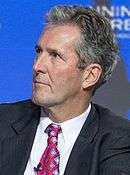 |
Pallister, Brian William | 3,676 | 12.2% | Endorsed Clark | |
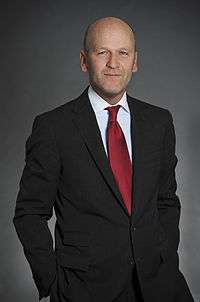 |
Fortier, Michael M. | 1,227 | 4.1% | Endorsed Clark | |
| Total | 30,100 | 100.0% | 30,100 | 100.0% | |
2003 Progressive Conservative leadership convention
The 2003 leadership convention was held in Toronto, Ontario on May 31, 2003.[4]
| Candidate | 1st ballot | 2nd ballot | 3rd ballot | 4th ballot | |||||
|---|---|---|---|---|---|---|---|---|---|
| Votes cast | % | Votes cast | % | Votes cast | % | Votes cast | % | ||
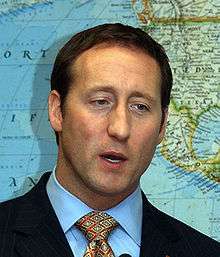 |
MacKay, Peter Gordon | 1,080 | 41.1% | 1,018 | 39.7% | 1,128 | 45.0% | 1,538 | 64.8% |
| Orchard, David | 640 | 24.3% | 619 | 24.1% | 617 | 24.6% | Endorsed MacKay | ||
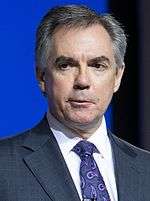 |
Prentice, James (Jim) | 478 | 18.2% | 466 | 18.2% | 761 | 30.4% | 836 | 35.2% |
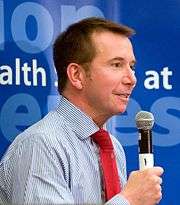 |
Brison, Scott A. | 431 | 16.4% | 463 | 18.0% | Endorsed Prentice | |||
| Chandler, Craig B. | 0 | — | Withdrew before 1st ballot began; Endorsed Prentice | ||||||
| Total | 2,629 | 100.0% | 2,566 | 100.0% | 2,506 | 100.0% | 2,374 | 100.0% | |
Two other candidates had participated in the race. Quebec MP André Bachand withdrew his candidacy from the race due to financial concerns and backed Peter MacKay. Former Cabinet Minister and Quebec MP Heward Grafftey also withdrew his candidacy from the race due to health concerns.
References
- "Conservative (1867-1942)". Parliament of Canada. Retrieved 7 February 2016.
- "1927 Conservative Leadership Convention". CPAC. Retrieved April 24, 2014.
- "Tories gather to seek road out of wilderness: 1,600 delegates gathering for convention expected to confirm Charest as leader". Globe and Mail. 28 April 1995.
- Jon H. Pammett and Christopher Dornan (ed) (2004). The Canadian General Election of 2004. Dundrun Press. pp. 81. ISBN 1550025163.CS1 maint: extra text: authors list (link)